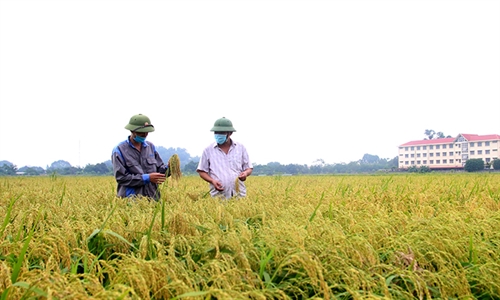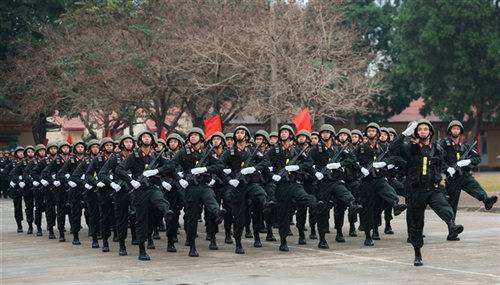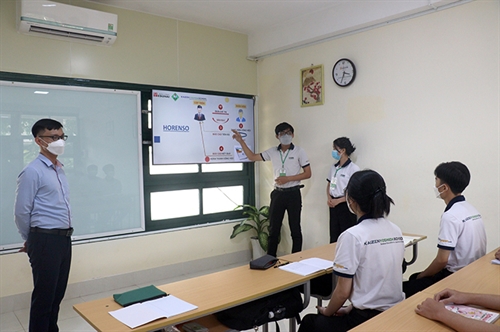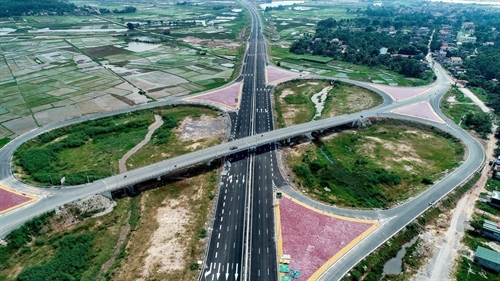The Ordinance on Administrative Sanctioning of Acts Obstructing Proceedings (the Ordinance), which was passed on August 18, 2022, by the Standing Committee of the 15th National Assembly, aims to create an adequate legal framework for administrative sanctioning of acts obstructing proceedings.
Taking effect on September 1 this year, the 48-article Ordinance introduces acts obstructing proceedings subject to administrative sanctioning, sanctioning forms and levels, consequence remedies, and measures to deter, and secure the handling of, administrative violations. It also defines sanctioning competence and procedures, execution of administrative sanctioning decisions, and enforcement of administrative sanctioning decisions for acts obstructing proceedings.
Scope of regulation of the Ordinance
As defined by the Ordinance, act obstructing proceedings which is subject to administrative sanctioning means an act of misconduct of an individual or organization which obstructs the settlement of a case or matter by a competent body or person in accordance with the Criminal Procedure Code, the Civil Procedure Code or the Administrative Procedure Law but does not constitute a crime and must be administratively sanctioned under the Ordinance.
The Ordinance specifies acts obstructing proceedings, sanctioning forms and consequence remedies for three groups of acts: (i) acts obstructing criminal proceedings; (ii) acts obstructing civil proceedings or administrative proceedings, consideration of and decision on application of administrative handling measures at People’s Courts, and consignment of drug addicts aged between full 12 years and under 18 years into compulsory drug addiction treatment facilities; and (iii) acts violating internal rules of court hearings or meeting sessions, and other acts.
Acts of misconduct of individuals or organizations which obstruct the settlement of cases or matters by competent bodies or persons in accordance with the Ordinance on the Order and Procedures for Consideration and Application of Administrative Handling Measures at People’s Courts and the Ordinance on the Order and Procedures for People’s Courts to Consider and Decide on Consignment of Drug Addicts Aged Between Full 12 Years to Under 18 Years into Compulsory Drug Addiction Treatment Facilities and do not constitute crimes will be administratively sanctioned as acts obstructing proceedings specified in the Ordinance.
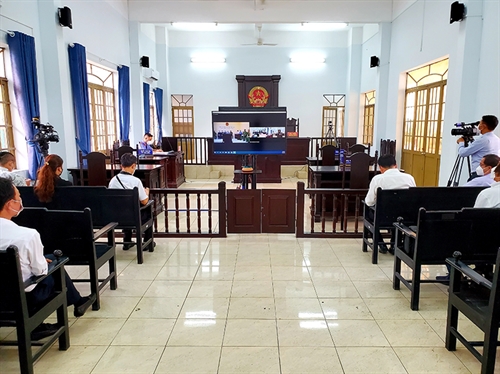 |
| The first online court hearing held in Ho Chi Minh City__Photo: Thanh Chung/VNA |
Subjects to be administratively sanctioned for acts obstructing proceedings
Article 5 of the Law on Handling of Administrative Violations specifically provides subjects to be sanctioned for administrative violations as follows:
- Persons who are between full 14 and under 16 years old will be subject to administrative sanctioning for administrative violations they intentionally commit, while persons who are aged full 16 years or more will be administratively sanctioned for any administrative violations;
- Organizations will be administratively sanctioned for all administrative violations they commit;
- Foreign individuals and organizations that commit administrative violations in the territory, contiguous zone, exclusive economic zone or continental shelf of the Socialist Republic of Vietnam; or on aircraft registered under Vietnamese nationality or seagoing ships flying the Vietnamese flag will be administratively sanctioned in accordance with Vietnam’s law, unless otherwise provided by treaties to which Vietnam is a contracting party.
The above-mentioned individuals and organizations who commit the acts specified in Chapter II of the Ordinance will be administratively sanctioned for acts obstructing proceedings.
In case cadres, civil servants, public employees, servicemen of the People’s Army and People’s Public Security forces, or persons engaged in cypher work commit acts obstructing proceedings while performing official duties or tasks and such acts pertain to their official duties or tasks, they will not be sanctioned in accordance with the law on handling of administrative violations but will be handled in accordance with the law on cadres, civil servants and public employees and relevant regulations, except the cases specified in Article 495 of the Civil Procedure Code, and Article 324 and Article 325.1 of the Administrative Procedure Law.
Assessors on duty who commit acts obstructing proceedings will not be sanctioned in accordance with the law on handling of administrative violations but will be handled in accordance with the Law on Organization of People’s Courts and relevant regulations.
Sanctions and fine levels
Article 5 of the Ordinance says that principal sanctions to be imposed for acts obstructing proceedings include caution and fine while the additional sanction is confiscation of exhibits of administrative violations and means used for commission of administrative violations. Principles of application of these sanctions must comply with Article 21.3 of the Law on Handling of Administrative Violations.
As specified in Article 6 of the Ordinance, the maximum fine to be imposed for an individual’s act obstructing proceedings is VND 40 million, which is twice that for an organization’s act. The fine levels mentioned in Chapter II of the Ordinance are those applicable to individuals’ acts obstructing proceedings. For the same violation act, the fine level to be imposed on an organization is twice that to be imposed on an individual.
Measures to deter, and secure the administrative handling of, acts obstructing proceedings
In case it is necessary to promptly deter administrative violations or to secure the administrative handling of acts obstructing proceedings, it is allowed to apply the measures specified in Clauses 1 thru 6, Article 119 of the Law on Handling of Administrative Violations, including custody of people; police escort of violators; temporary seizure of exhibits and means used for commission of administrative violations, licenses, and practice certificates; body search; search of means of transport and objects; and search of places where exhibits and means used for commission of administrative violations are hidden.
